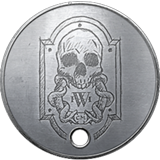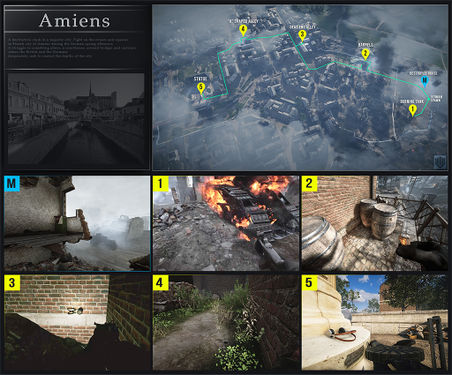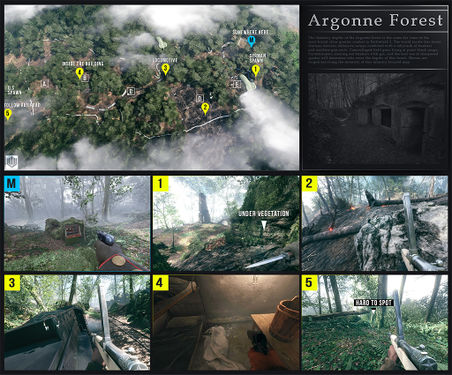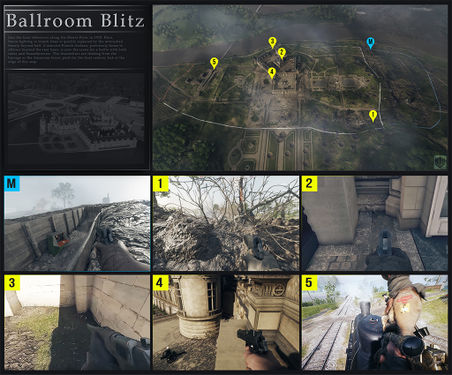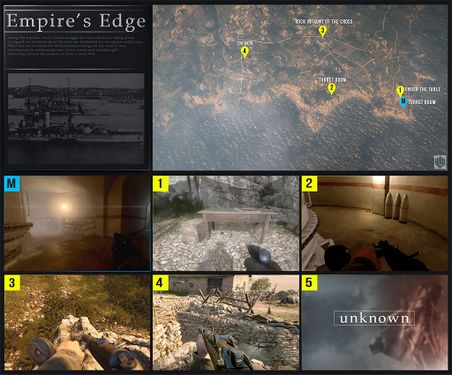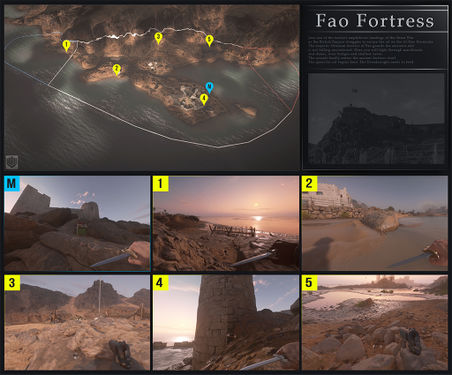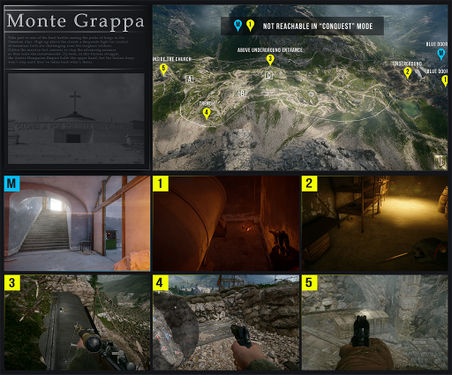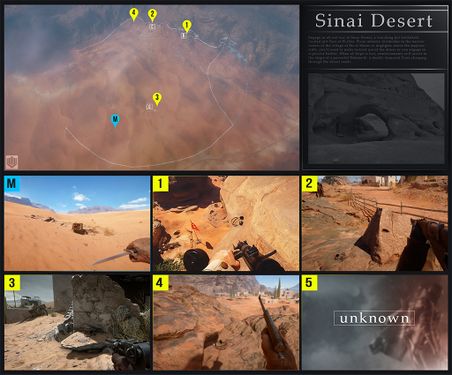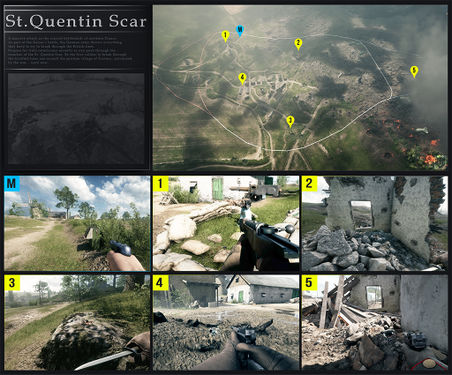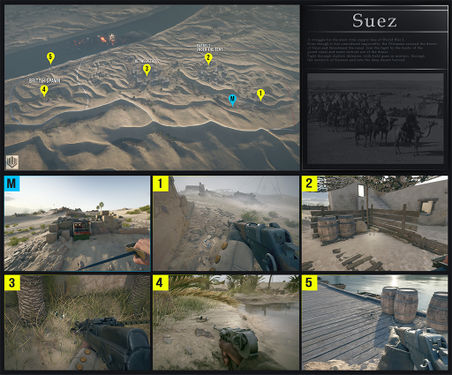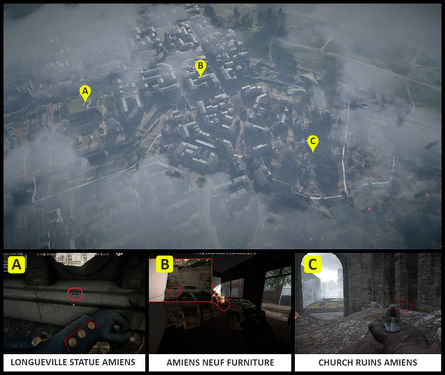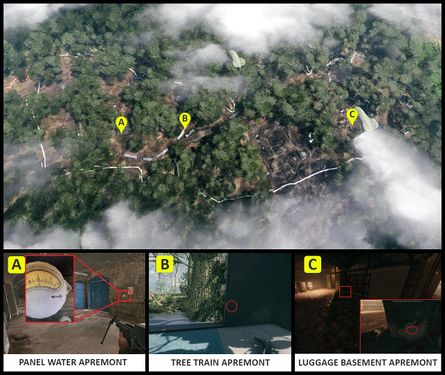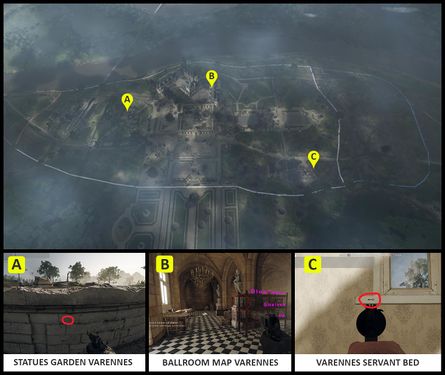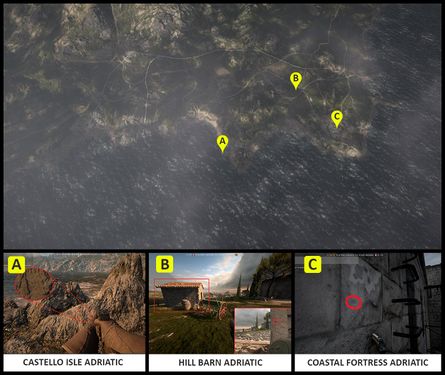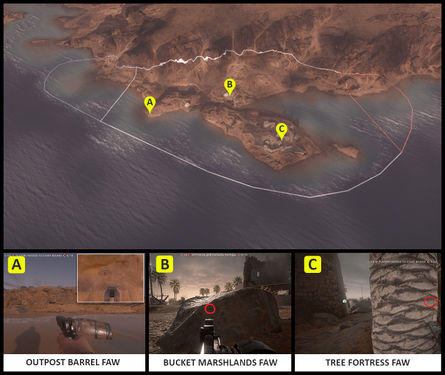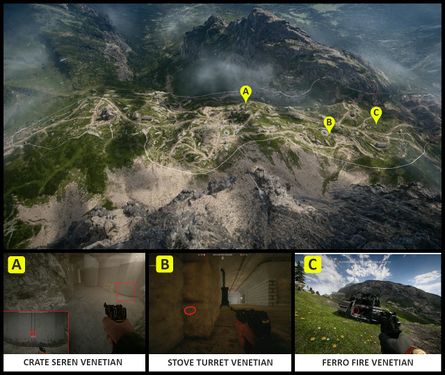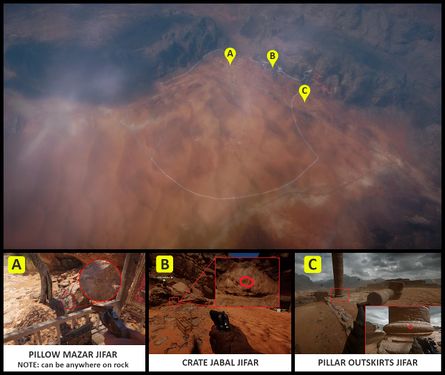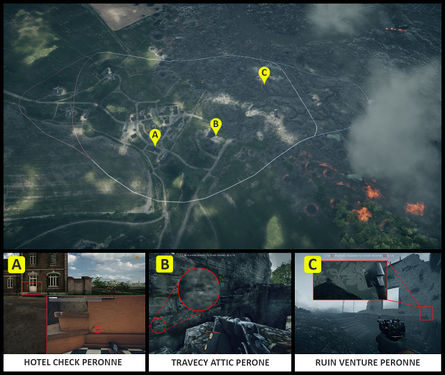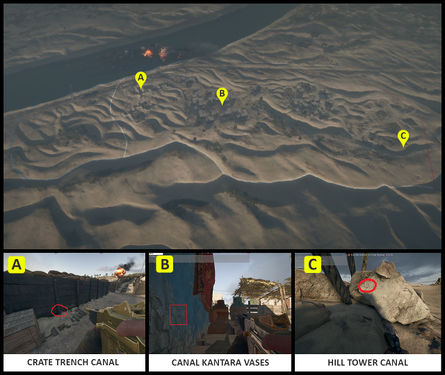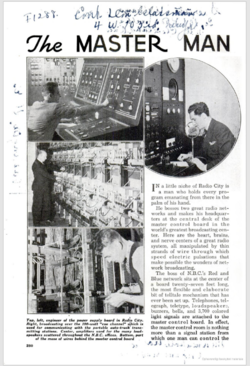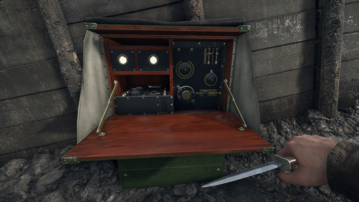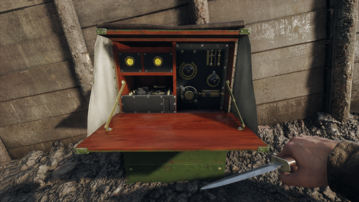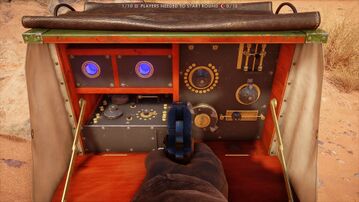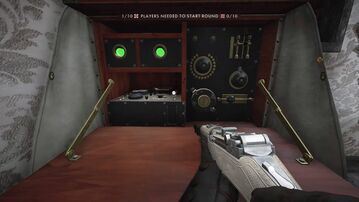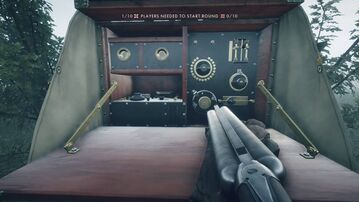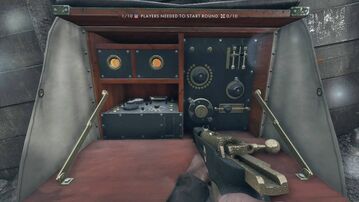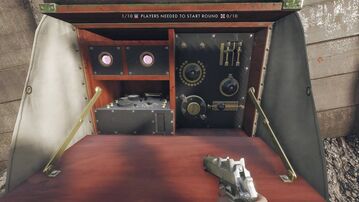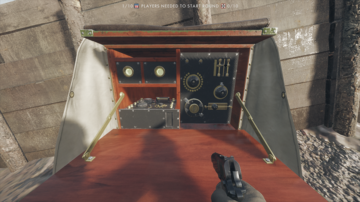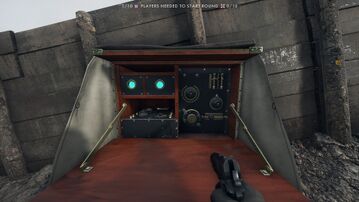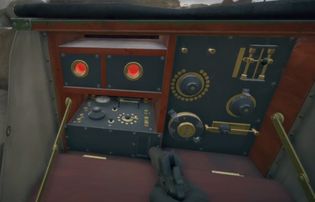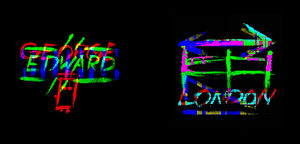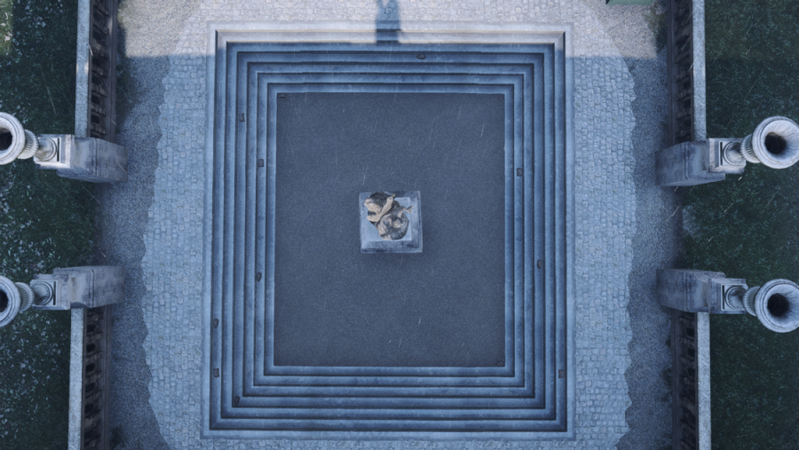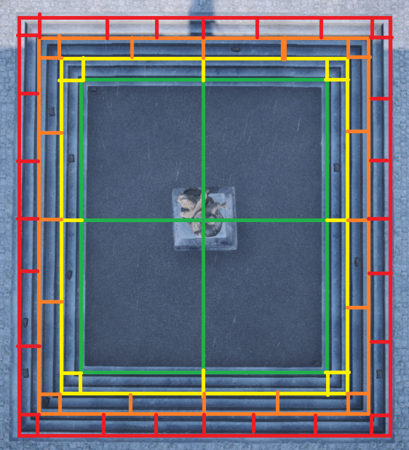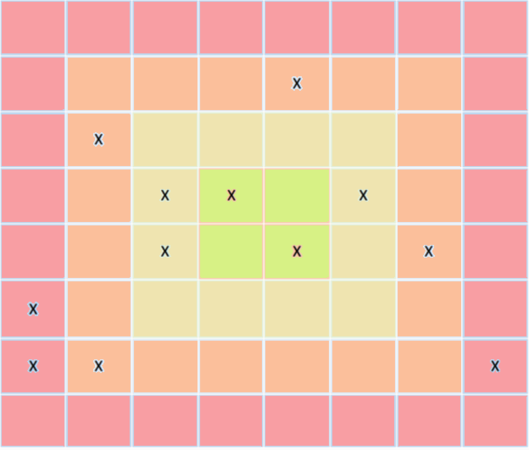Battlefield 1: Difference between revisions
| Line 311: | Line 311: | ||
It was discovered that destroying every light source in the château on the Soissons map causes a [https://youtu.be/g0RIu2Bkim4 mechanical sound effect] to play. After doing this, the bases of the candle stands become interactable - players can switch them on or off. Interacting with candles causes the states of surrounding candles to switch, along with the position in that candle's cycle. There are a total of 7 candles in the château. Once all the candles have been illuminated, another mechanical noise is heard, which allows us to advance to the next stage. | It was discovered that destroying every light source in the château on the Soissons map causes a [https://youtu.be/g0RIu2Bkim4 mechanical sound effect] to play. After doing this, the bases of the candle stands become interactable - players can switch them on or off. Interacting with candles causes the states of surrounding candles to switch, along with the position in that candle's cycle. There are a total of 7 candles in the château. Once all the candles have been illuminated, another mechanical noise is heard, which allows us to advance to the next stage. | ||
The seven candles each switch the state of one or two others. When any candle is activated, the candles that are switched | The seven candles each switch the state of one or two others. When any candle is activated, the candles that are switched would rotate one position counterclockwise around the activated candle. By activating a single candle seven times and recording the results, you can learn all of the switch patterns and know they are back where they started. With this knowledge it is possible (with some brain bending) to work out how to illuminate all the candles. This could of course be done with pen-and-paper, but there is an [https://drive.google.com/open?id=0B_Lrn-yWBcQsRXRLWF9mQVVaeTg Excel spreadsheet] (made by Disposalist) as well as an [http://candles.herokuapp.com/ app] that may also prove useful. | ||
Also, after pressing a candle seven times, only one candle's state will be changed. All candles go back to their original states after a candle has been pressed fourteen times. | Also, after pressing a candle seven times, only one candle's state will be changed. All candles go back to their original states after a candle has been pressed fourteen times. | ||
Revision as of 01:07, 1 November 2017
| Battlefield 1 | |
|---|---|
| The Battlefield 1 ARG - Headphones and Morse code led to mysterious unlockable dog tags. | |
| Type | [[List_of_Investigations#Official|Official]] |
| Creator | EA Dice |
| Discovered | 2017-02-14 |
Main Page > List of Investigations > Battlefield 1
This wiki page documents the ARG that is hidden in Battlefield 1. This page includes step-by-step instructions to unlock the secret "A Beginning" and "A Conflict" dog tags. Currently, the primary solving hub for this ARG is the Battlefield Easter Egg community, who have a Discord server here, a wiki here, and a YouTube channel here.
In addition to the main ARG/Easter egg which unlocks the secret dog tags, there are several other prominent Easter eggs which have been discovered in the game:
| Battlefield 1 Easter Eggs | |
|---|---|
| Miscellaneous | Smaller, less convoluted Easter eggs |
| Balloon House | A house kept aloft by balloons, referencing the movie 'Up' |
| Megalodon | A giant shark hidden on Fort de Vaux |
(Note: Main ARG/Easter egg is disabled in password-protected servers!)
Headphones and Morse code
One pair of headphones is hidden on each map. The headphones are indestructible and can be located on every server, as long as they have not already been picked up. It appears that there are 5 spawn locations per map, although some of them remain undiscovered. The headphones can be picked up by any player by walking over them. Upon approaching a hidden telegraph station after having retrieved a pair of headphones, the player will hear some Morse code being tapped out. A player can carry only one pair of headphones at a time, and only the player wearing the headphones will be able to hear the Morse code when near enough to a hidden telegraph station.
Headphone Locations
Here is is a series of images, made by RenegadeX5, which display locations of headphones and telegraph station on each map. In order to hear the Morse code, you need to pick up the headphones from one of the 5 locations on each map (you might need to check all 5 before finding them!) and bring them to the telegraph station.
(Note: you can click each image to get a larger version.)
-
Amiens
-
Argonne Forest
-
Ballroom Blitz
-
Empire's Edge
-
Fao Fortress
-
Monte Grappa
-
Sinai Desert
-
St. Quentin Scar
-
Suez
When the headphones and telegraph stations were first discovered, the Morse code was meaningless gibberish. However, the contents of the Morse code changed in future patches.
Fall Update
On November 15th, Battlefield 1 received an update which changed the Morse code heard on all maps' hidden telegraph stations to the following:
.--. .-. . ...- .. --- ..- ... | -- . ... ... .- --. . | -.-. --- .-. .-. ..- .--. - . -.. .- .-- .- .. - | ..-. ..- .-. - .... . .-. | .. -. ... - .-. ..- -.-. - .. --- -. ...
PREVIOUS MESSAGE CORRUPTED AWAIT FURTHER INSTRUCTIONS
Additionally, the patch changed the following things:
- Ballroom Blitz had a telegraph station and headphones added to it, whereas pre-patch it was the only map with neither
- The spawn locations of many headphones on most maps were changed
- The above Morse message now plays on loop until the telegraph station eventually explodes, although this appears to be buggy
- Once the telegraph station explodes, headphones stop spawning on the map
- Dying after having retrieved a pair of headphones will no longer cause a new pair of headphones to spawn
- Only one pair of headphones will spawn upon the initiation of a round on each map
Winter Update
On February 14, the Winter Update was released. The Morse code changed again, to the following message:
GO STRAIGHT TO <location_name>. OLD METHODS COMPROMISED. MUST ACQUIRE NEW KEY. WILL MISS DROPOFF IF DELAY OR INCORRECT LOCATION.
Each user hears a different location name; locations are randomly assigned to players. There are 27 locations total: 3 locations on each of the 9 maps. In order to advance through the Easter egg, you need to know which location you are assigned; here is a tutorial (courtesy of Dunem) to help you read your Morse code. This is the list of locations, along with their respective maps, in alphabetical order:
AMIENS NEUF FURNITURE: AmiensBALLROOM MAP VARENNES: Ballroom Blitz (FormerlyABBEY MAP VARENNES)BUCKET MARSHLANDS FAW: Fao FortressCANAL KANTARA VASES: SuezCASTELLO ISLE ADRIATIC: Empire EdgeCHURCH RUINS AMIENS: AmiensCOASTAL FORTRESS ADRIATIC: Empire EdgeCRATE JABAL JIFAR: Sinai DesertCRATE SEREN VENETIAN: Monte GrappaCRATE TRENCH CANAL: SuezFERRO FIRE VENETIAN: Monte GrappaHILL BARN ADRIATIC: Empire EdgeHILL TOWER CANAL: SuezHOTEL CHECK PERONNE: St. Quentin ScarLONGUEVILLE STATUE AMIENS: AmiensLUGGAGE BASEMENT APREMONT: Argonne Forest (FormerlyLUGGAGE BASEMENT VARENNES)OUTPOST BARREL FAW: Fao FortressPANEL WATER APREMONT: Argonne Forest (FormerlyPANEL WATER VARENNES)PILLAR OUTSKIRTS JIFAR: Sinai DesertPILLOW MAZAR JIFAR: Sinai DesertRUIN VENTURE PERONNE: St. Quentin ScarSTATUES GARDEN VARENNES: Ballroom Blitz (FormerlySTATUES GARDEN APREMONT)STOVE TURRET VENETIAN: Monte GrappaTRAVECY ATTIC PERONNE: St. Quentin ScarTREE FORTRESS FAW: Fao FortressTREE TRAIN APREMONT: Argonne Forest (FormerlyTREE TRAIN VARENNES)VARENNES SERVANT BED: Ballroom Blitz (FormerlyAPREMONT RITZ BED)
The message will repeat until you move away from the telegraph station, at which point the telegraph station will explode. Each of the locations mentioned above has a symbol near it.
Symbols
The first symbols discovered at each location are difficult to find; they are small double arrows pointing to the left and right, and only appear when the player comes within 0.4 meters. A player will typically need to crouch or go prone in order to be able to see their symbol. Additionally, players can only see the symbol at the location they've been "assigned" to. When examining a symbol up close, a distinct sound is played (video). Pictured below are all 27 symbol locations, sorted by the map they appear on (maps made by Darrel).
NOTE: If you're having trouble finding your location with the images below, Jambajeww has made a video guide for all 27 locations, with timestamps for each location in the description of the video.
-
Amiens
AMIENS NEUF FURNITURE
CHURCH RUINS AMIENS
LONGUEVILLE STATUE AMIENS -
Argonne Forest
LUGGAGE BASEMENT APREMONT
PANEL WATER APREMONT
TREE TRAIN APREMONT -
Ballroom Blitz
BALLROOM MAP VARENNES
VARENNES SERVANT BED
STATUES GARDEN VARENNES -
Empire's Edge
CASTELLO ISLE ADRIATIC
COASTAL FORTRESS ADRIATIC
HILL BARN ADRIATIC -
Fao Fortress
BUCKET MARSHLANDS FAW
OUTPOST BARREL FAW
TREE FORTRESS FAW -
Monte Grappa
CRATE SEREN VENETIAN
FERRO FIRE VENETIAN
STOVE TURRET VENETIAN -
Sinai Desert
CRATE JABAL JIFAR
PILLAR OUTSKIRTS JIFAR
PILLOW MAZAR JIFAR -
St. Quentin Scar
HOTEL CHECK PERONNE
RUIN VENTURE PERONNE
TRAVECY ATTIC PERONNE -
Suez
CANAL KANTARA VASES
CRATE TRENCH CANAL
HILL TOWER CANAL
Second Message
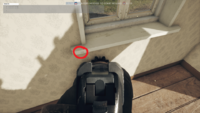
VARENNES SERVANT BED locationAfter a player discovers their symbol, returning to a telegraph station with headphones yields another message in Morse code. Additionally, the telegraph station's lights glow yellow instead of their usual white when broadcasting this message. The message starts with one of the above location names, but reversed:
<reversed_location_name> REMEMBER FIRST RULE. IF COMPROMISED L PILL.
An L PILL is short for lethal pill, a pill intended to be taken by soldiers to commit suicide rather than be tortured. Visiting the specified reversed location, the second location, yields a triangle symbol in place of the normal double-arrow symbol. The second symbol appears in the exact same spot that the first symbol may appear for other players.
Third Message

After a player discovers the triangle symbol at their second location, returning to a telegraph station with headphones yields another message. This time, the telegraph station's lights glow purple. Here's the text of the message:
<atbash_cipher> SECOND RULE. SIGHTING. REPORT AND WAIT. INVESTIGATING ALONE COULD LEAD TO DEATH
Solving the Atbash cipher in the message yields another location from the list above. Visiting the third location leads to an arrow symbol pointing right.
Fourth Message

Returning to a telegraph station after discovering the third symbol yields yet another message. This time, the telegraph station's lights glow green (previously, they glowed white, yellow, and purple for the first, second, and third messages respectively). Here's the text of the message:
<rot_cipher> THIRD RULE. IF TAKEN BY THE OTHERS DISCOVER MEANS TO COMMUNICATE TO HOUSE
Solving the ROT cipher with a key of 7 (N = 19) yields another location from the list of locations, leading to a fourth symbol, which is shown on the right.
Fifth Message

After finding the fourth symbol, the telegraph station's light color turns transparent. This message begins with a location from the list of locations:
<rail_fence> FOURTH RULE. KILL ALL ON SAME TRAIL. REMOVE DOG TAGS AND REPORT TO HOUSE
To get the plaintext, at least one of these two ways will be effective depending on the given ciphertext: the encrypted plaintext must be either reversed and decrypted using the rail fence cipher (with 5 rails, and 0 offset) or directly decrypted using the same cipher with 5 rails and 6 offsets instead.
Note that the previous symbol, the fourth symbol, is in the shape of a fence, which may be interpreted as a hint for the correct decryption method for this cipher (rail fence cipher).
The fifth symbol is a pattern of broken and unbroken dashes.
Note: the cipher on this stage can also be solved as an anagram.
Sixth Message

After finding the fifth symbol, the telegraph station's lights turn to an orange color. Here's the content of the sixth message:
<double_cipher> MORSE MESSAGES BEING INTERCEPTED. BEGINNING FULL ENCRYPTION SOON
The "double_cipher" is comprised only of single dots and single dashes: E's and T's in Morse code. The cipher can be solved by converting the transmission into A's and B's, where A is a dot and B is a dash. Then decode the ciphertext (AABBABABBAA etc) using a Baconian cipher, then decode the output of the Baconian cipher with an Atbash cipher to obtain another location from the list.
Visiting the sixth location yields the sixth symbol: a series of horizontal and vertical lines with the name "EDWARD" prominently featured between them.
Seventh Message
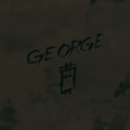
After finding the sixth symbol, the telegraph station's lights turn to a pink color. Here's an example seventh message, which is a Vigenère cipher:
PXCGRJIEWSVPIQPVRUIQJEJDPOEEJFEQXETOSWDEUDWHJEDLIVANVPMHOCRQFHYLFWLHZAJDPOEEJDPZWYJXWHED
This transmission is encoded via Vigenère Cipher with the key "Edward". It decodes to:
LUGGAGEBASEMENTVARENNESALLIESCANBECLOTHEDASENEMIESENEMIESCANBECLOTHEDASALLIESALWAYSUSEID
LUGGAGE BASEMENT VARENNES ALLIES CAN BE CLOTHED AS ENEMIES. ENEMIES CAN BE CLOTHED AS ALLIES. ALWAYS USE ID
In the example above, LUGGAGE BASEMENT VARENNES may be replaced with any of the locations from the complete list. Going to the specified location reveals the seventh symbol, which prominently displays the word "George" above a crude drawing.
Eighth Message

After finding the seventh symbol, the telegraph station's lights turn to a lime color. Here's an example eighth message, which is an autokey cipher:
ONADIFZWMPTJSHJGXROUUEKUWFHGJHNWUYMESYQYXXFAWAUGQNMESY
This message decodes to the following, by using an autokey cipher with passphrase of "George" and alphabet key of ZABCDEFGHIJKLMNOPQRSTUVWXY:
HILLBARNADRIATICFINALBELIEVEEVERYTHINGREPORTEVERYTHING
HILL BARN ADRIATIC FINAL BELIEVE EVERYTHING REPORT EVERYTHING
In the example above, HILL BARN ADRIATIC may be replaced with any of the locations from the complete list. The eighth symbol, which is just the word "LONDON", will be at the specified location.
Ninth Message
After discovering the eighth "LONDON" symbol, the telegraph station's lights turn cyan. In a deviation from the normal structure of the Morse code, this cipher is identical for everyone:
ZQBRIPPQOHBFIUPEYLAZAMARZIOZDSYJB
After a long search, it was finally discovered that reversing the above ciphertext and using the reverse as input for an autokey cipher with key "LONDON" and custom alphabet ZABCDEFGHIJKLMNOPQRSTUVWXY yields:
PUKOOLYNOCLABLLIMDNIWWODAHSSTNAIG
If you reverse this output, it reads:
GIANTSSHADOWWINDMILLBALCONYLOOKUP
GIANTS SHADOW WINDMILL BALCONY LOOK UP
A Beginning
The final Morse code, once deciphered, directs the player to the balcony of a windmill on the map Giant's Shadow; specifically, the windmill nearest to the German Empire deployment. Standing on the balcony of the windmill and looking outward/slightly upwards (video) while waiting for exactly two minutes will trigger a courier pigeon to swoop past the player. The same dramatic sound effect heard when viewing the symbols will play, and it is a this point that a new dog tag becomes available to the player. The tag is named "A Beginning", and has the description "You've found something that does not belong to you.". It should be noted that a player will only be able to trigger the pigeon if their telegraph station is on the cyan lights stage (stage 9) - you cannot skip the previous stages. If the dramatic sound does not trigger when the pigeon passes, the process must be repeated until the sound is triggered. Some reports indicate that the sound will not trigger unless the pigeon passes through the player, touching them. Nonetheless, if the pigeon is flying past you, you are at the right stage and have completed the necessary prerequisites.
In addition to the dog tag, the player's telegraph station's lights will change to a red color. Another Morse code message can be heard with headphones, but at a lower pitch than before, and accompanied by eerie background noise and apparent screaming (video). The message decodes to:
MASTER MAN
The code repeats indefinitely. The meaning of MASTER MAN has yet to be determined, and the whispering/screaming noises in the background have yet to be clearly transcribed. It has been noted that the Morse code definitely has a space between "Master" and "Man".
One popular but unproven interpretation of the MASTER MAN code is that it refers to Charles Masterman, a prominent British politician who worked in the propaganda department during WWI. Reinforcing this theory is the presence of the letters CM found on the dog tag, which are Charles Masterman's initials.
Another theory is that MASTER MAN refers to a radio operator, as shown below. As shown, he has access to telegraphs and colored light signals on a master control board. Through an in-game message by a DICE employee, we were told that "Red is a signal color", in response to queries about the telegraph station's red light.
Additional Resources
All the telegraph station's light colors:
-
Stage 1 (white lights)
-
Stage 2 (yellow lights)
-
Stage 3 (purple lights)
-
Stage 4 (green lights)
-
Stage 5 (clear lights)
-
Stage 6 (orange lights)
-
Stage 7 (pink lights)
-
Stage 8 (lime lights)
-
Stage 9 (cyan lights)
-
Stage 10 (red lights)
The following image was datamined after the release of the Winter Update patch on February 14, 2017:
Between its color channels, this image contains all of the symbols mentioned above.
Prise de Tahure Update
On July 20, 2017, another map was added to the game called Prise de Tahure. Located on the map were several records, along with a gramophone, much like in the Megalodon Easter egg. Bringing a record to the gramophone makes it play the Battlefield 1 theme tune. At this time it is unknown if the records and gramophone have another purpose.
Four Square Cipher
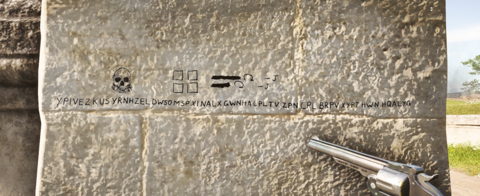
Also on July 20, a cipher was added to a pillar near the lake northeast of the Château on Soissons. Above it were several graphical hints, including the icon of the A Beginning dog tag that was unlocked earlier in the ARG. The text of the cipher is as follows:
YPIVEZKUSYRNHZELDWSOMSPXINALXGWNHACPLTVZPNCPLBRPVXYPTHWNHQALYG
When solved as a four-square cipher using the keywords of MASTER and MAN, and reversing the remainder of the alphabet, the cipher was decoded:
INSIDE THE CHATEAU WHEN ALL IS DARK THERE YOU GO AND YOU WILL FIND THE SPARKS
Lights Out
It was discovered that destroying every light source in the château on the Soissons map causes a mechanical sound effect to play. After doing this, the bases of the candle stands become interactable - players can switch them on or off. Interacting with candles causes the states of surrounding candles to switch, along with the position in that candle's cycle. There are a total of 7 candles in the château. Once all the candles have been illuminated, another mechanical noise is heard, which allows us to advance to the next stage.
The seven candles each switch the state of one or two others. When any candle is activated, the candles that are switched would rotate one position counterclockwise around the activated candle. By activating a single candle seven times and recording the results, you can learn all of the switch patterns and know they are back where they started. With this knowledge it is possible (with some brain bending) to work out how to illuminate all the candles. This could of course be done with pen-and-paper, but there is an Excel spreadsheet (made by Disposalist) as well as an app that may also prove useful.
Also, after pressing a candle seven times, only one candle's state will be changed. All candles go back to their original states after a candle has been pressed fourteen times.
Note: If you don't press anything for 4 minutes the candles will reset and the switch patterns will change!
Tile Puzzle
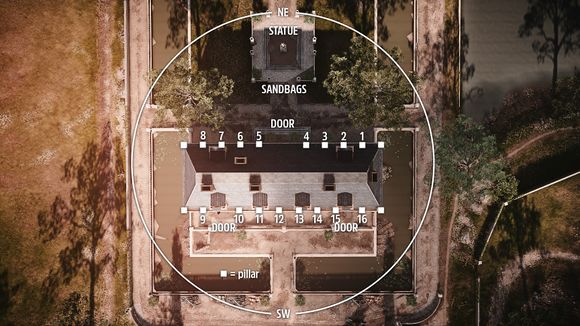
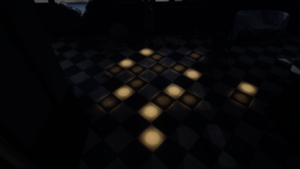
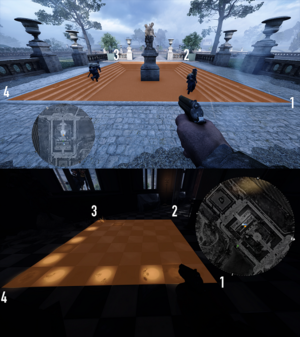
After lighting up all the candles in the château and hearing the second mechanical noise, some wall panels on pillars on the outside of the château become interactable. There are 8 pillars on the north side of the château, and 8 on the south side.
To the northeast of the château, there is a statue sunk into the ground, along with 8 concentric square steps leading down towards it. After the second mechanical noise is heard, a randomly-generated pattern of sandbags appear on 4 of these steps. They only appear while no one is looking at the steps. The goal here is to manipulate the floor lights inside the château so their pattern matches the pattern of sandbags around the statue.
The pattern of tiles inside the château consists of an 8 by 8 grid. At the beginning all tiles are turned off. Each individual tile can be manipulated using a pair of wall panels. There are 8 panels on the north side of the château, and 8 panels on the south side - each panel corresponds to either a row or a column on the grid. Pressing the pair of panels corresponding to a specific row and column cause the appropriate light to toggle on or off. For example, if you were to press the "2nd column" panel and the "4th row" panel, then the light in position (2, 4) on the board would be toggled.
However, there is a twist: the rows and columns the panels correspond to are completely randomized in each server. There is no grouping to the panels; for example, not all panels on the north side are the row-controlling panels. This randomization means that players need to use trial and error in each game in order to determine which panels activate which rows and columns.
One method for accomplishing this is as follows:
- Press any 2 panels outside the château to activate the a tile light. Note the initial configuration of lights, either by taking a screenshot or by marking it down.
- Choose an arbitrary panel from one of the 16 panels outside the château. (You could start with the panel labelled '1' on the map shown above.)
- Try pressing your chosen panel followed by another arbitrary panel. (Again, you could use the panel labelled '2' on the map.)
- Check the light grid. If no lights have changed, pick a new panel as your second panel, and try pressing it along with your first one. Repeat this until a light changes on your grid.
- Once a light on your grid has changed, note its position in the grid along with the panels you used to activate it.
- Pick a different panel that you haven't tried yet as your second panel, keeping the first panel the same. Continue to try new combinations that include the first panel until another light is toggled.
- By this point, you should have toggled 2 different lights, and you should have had 1 panel (the first panel) in common with both of those lights. The two lights you toggled will share either a row or a column on the grid.
- The panel the lights had in common (the first panel) can now be associated with the row or column that contained the toggled lights. The other 2 panels you pressed can be associated with the intersecting rows or columns.
- Repeat the whole process, starting with a different panel. Continue until every panel's row or column is identified.
Example:
- Let's say we start out trying to identify Panel 1.
- We try pressing Panel 1 and Panel 2, but nothing changes, so we move on.
- We try pressing Panel 1 and Panel 3, and a light changes at position (1, 5) (first column, fifth row). We note this down and move on.
- We try pressing Panel 1 and Panel 4, but nothing changes.
- We try pressing Panel 1 and Panel 5, but nothing changes.
- We try pressing Panel 1 and Panel 6, and a light changes at position (6, 5) (sixth column, fifth row). We note this down.
- The two lights that changed were both part of the 5th row, and we pressed Panel 1 in both cases. Therefore, Panel 1 must be the button for the fifth row.
- In addition, from the first light that changed, since we know that Panel 1 is the button for the fifth row, Panel 3 must be the button for the first column.
- Similarly, from the second light, since we know that Panel 1 is the button for the fifth row, Panel 6 must be the button for the sixth column.
From here, determining the rest of the panels' functions by trying unknown panels with known ones is easy.
Note: If a given pair of buttons causes no change in the light grid, they must both either be for rows or columns, since they do not intersect.
Once each panel's functionality has been determined, matching the lights up with the sandbags is a fairly simple (if tedious) task. The sandbags appear on only 4 of the 8 concentric steps, which correspond to square "rings" on the light grid. The position of the sandbags along each step indicates that the light in the corresponding location on the grid needs to be turned on. All other lights need to be turned off.
An example sandbag pattern is shown below:
-
A pattern of sandbags on the square stairs around the statue (up = northeast)
-
Fitting the sandbag positions to the 8 by 8 grid
-
The corresponding pattern that needs to be illuminated on the grid (up = west)
A Conflict
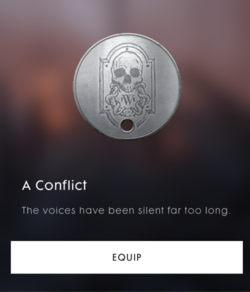
Once the tile/sandbag puzzle has been completed, a plume of black smoke appears, and the A Conflict dog tag is awarded to the player who activated the final panel - the dog tag is NOT awarded to all players on the server, only the person who completes the Easter egg! The dog tag has the same skull icon as the A Beginning dog tag, but is silver instead of bronze.
Note: The A Beginning dog tag is not required to unlock the A Conflict dog tag!
The dog tag's description is as follows:
The voices have been silent far too long.
Prominently featured on the dog tag are the stylized initials WH. It is suspected that WH is an abbreviation for Wellington House, which was Britain's War Propaganda bureau during World War 1. The organization was led by Charles Masterman, whose initials were seen on the A Beginning dog tag, further confirming the connection.
